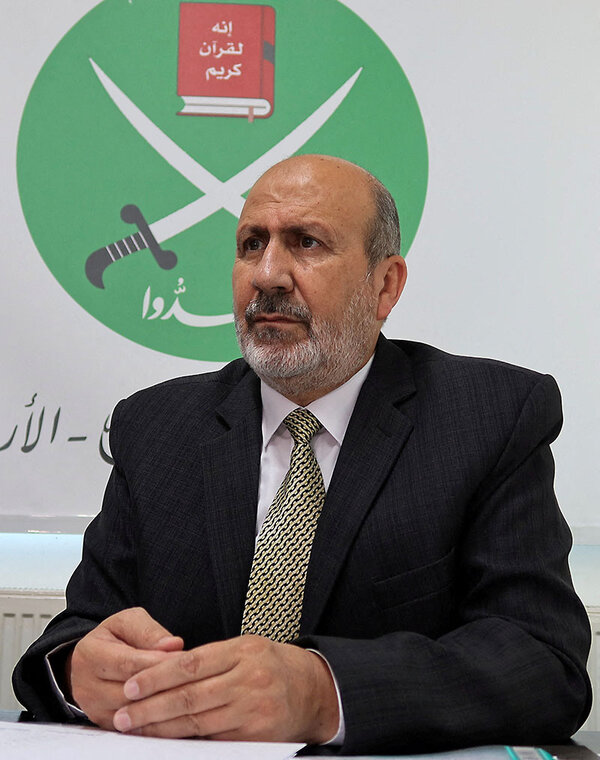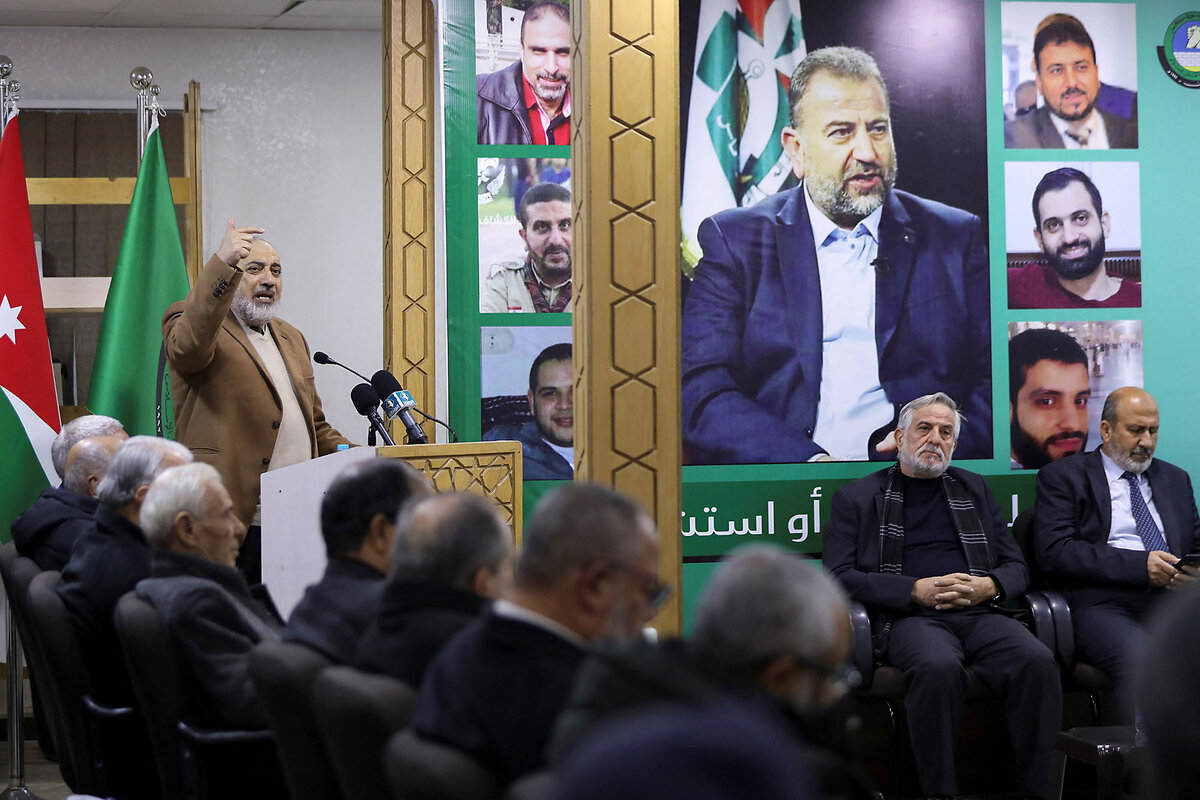Jordan wants to avoid proxy war. Banning the Muslim Brotherhood just made it harder.
Loading...
| Amman, Jordan
As its neighbors in the Middle East have been plunged into regional conflict, Jordan has stood as a rare, neutral stronghold of peace, resisting being dragged into proxy war.
But Israel’s continued war in Gaza has put new pressure on the Arab kingdom, with members of Hamas calling on like-minded allies in Jordan to open a front against Israel.
In April, Jordanian authorities uncovered a militant cell of the Muslim Brotherhood, a century-old conservative Islamist organization founded in Egypt with offshoots across the Middle East. Sixteen members of the Muslim Brotherhood in Jordan were arrested on suspicion of manufacturing rockets and drones to be used inside or outside Jordan, and many experts suspect they could be affiliated with Hamas or the paramilitary group Hezbollah in Lebanon.
Why We Wrote This
Jordan has heralded itself as a bulwark of peace in the Middle East. But the cost of avoiding a proxy war has sparked a political crisis at home that, in turn, could threaten the kingdom’s stability.
In order to curb what it saw as militant activity, the country enforced a sweeping ban of the Muslim Brotherhood, its largest opposition movement. And it’s now unclear whether a political party called the Islamic Action Front (IAF) that is informally affiliated with the group will be allowed to operate. Outlawing both not only sparks a political crisis, but could also serve to radicalize adherents who feel they are left with no political home.
The disbanding has set the stage for a showdown between the government and thousands of defiant members of the conservative Islamist movement – and risks dragging Jordan into the very conflicts it has sought to avert.
“This is not a party that you can ignore, dissolve, and resume business as usual,” says Oraib Rantawi, director of the Amman-based Al Quds Center for Political Studies.
Brotherhood ban
Jordan’s ban on the Muslim Brotherhood, announced late last week, includes the seizure of its assets and forbids any contact with, cooperation with, or promotion of the Brotherhood in the country, with the threat of legal action.
The danger, Jordanian officials say, was imminent.
The government alleges the suspects, including two senior members, were trained and financed in Lebanon. Although authorities say the missiles were intended to hit targets on Jordanian soil, their short, 2-to-3-mile range could have been used to target Israel from the Jordan Valley.
Multiple analysts say the missiles may have also been designed to target U.S. interests in Jordan – America retains some 3,500 troops in the kingdom – as part of a potential future Iranian-led retaliation for American or Israeli strikes on Iran.
Jordanian authorities also busted attempts to build a drone factory and recruit Jordanians on behalf of “foreign operatives.” All 16 suspects have been referred to the state’s security court pending investigations.
Although not directly stated by Jordanian authorities, the training and involvement of foreign operatives in Lebanon is widely believed to indicate involvement by either Hezbollah or Hamas to bolster their aims from inside Jordan.
Hamas issued a statement last week in support of the militant cell, hailing it as “honorable” and urging Jordan to “immediately release these young men.”
Observers say expanding operations into Jordan has been a longtime goal of both Iran’s “Axis of Resistance” and Hamas, accelerated by the war in Gaza.
The missile-manufacturing raid came six months after two Jordanian Brotherhood members infiltrated Israel and opened fire, wounding two Israeli soldiers before being killed – an act that was endorsed and celebrated by the Jordanian Brotherhood as “resistance.”
In the past two years, authorities have busted several attempts to smuggle weapons and explosives into the kingdom from neighboring Syria and Iraq.
Hamas spokesperson Abu Obeida has repeatedly called for an escalation in Jordan against Israel, describing it as “one of the most important fronts.”
“Gaza was the trigger; it activated Hamas’ and Hezbollah’s project of making Jordan one of the fronts of confrontation with Israel and the West,” says Amer Al Sabaileh, an independent Jordanian political analyst.
“When they lost their battles in Gaza and Lebanon, they thought they could punish the U.S. in Jordan.”
Political consequences
While Jordan has avoided becoming a staging ground for Hamas and the “Axis of Resistance,” it now must confront the ramifications of outlawing its largest political movement.
The measures the government takes, if any, against the IAF will determine how large the crisis grows.
The Muslim Brotherhood has long been a political home for tens of thousands of conservative, middle-class Jordanians and professionals.
While the Brotherhood has positioned itself as a pro-Palestinian, anti-Israel movement, domestically it has been a movement of choice for those Jordanians demanding reform and who believe Islam should play a role in governance, or who simply want to “protect” family values.
The IAF was the top performer in September’s parliamentary elections, garnering a third of all votes cast; its 31 members of Parliament represent the largest single bloc in the 138-seat Parliament.
Multiple Brotherhood and IAF officials declined to comment, citing the ongoing court case.
Instead, they pointed to an IAF statement underlining the “party’s firm and clear position of preserving Jordan’s security and stability” and “rejecting any targeting of it.”
In a session of Parliament last week, facing calls from fellow MPs for IAF members to be expelled and their party dissolved, IAF MP Dima Tahboub stressed the party’s “confidence in the Jordanian judiciary” and its position that “carrying arms is the exclusive right of the state.”
But its future hangs in the balance.
Should a Jordanian court determine that the Muslim Brotherhood is guilty of terrorist activity and prove its links to the IAF, the party could be instantly dissolved by a court order.
Should the IAF be allowed to continue, observers say Jordan may see a shift with Brotherhood followers becoming registered members of the IAF, which is under stricter laws and regulations as a licensed political party.
“But if the party is dissolved as the result of the investigations, this huge trend in our society known as the Islamist movement will have no legal body to represent them or organize their participation in the public sphere and political life,” says Mr. Rantawi.
The two divergent paths could either encourage “moderates” within the IAF to emerge and distance themselves from Hamas or drive the younger generation of the Brotherhood movement to “become radicalized,” the analyst says.
Rank-and-file members of the Brotherhood already strike a defiant tone, vowing to continue to organize, protest, and voice criticism of both the Jordanian authorities and the war in Gaza.
“We will not surrender,” said one member, who declined to use his name due to the threat of arrest. He described the foiled terror plot as an attempt to pin individual acts on the movement, vowing, “We will endure and adapt.”
“They dissolve the Muslim Brotherhood, but they cannot dissolve the voice of tens of thousands of Jordanians who carry its message of change, reform, and Islam,” said a second Brotherhood supporter. “You can jail the messenger, but you can’t jail the message.”








